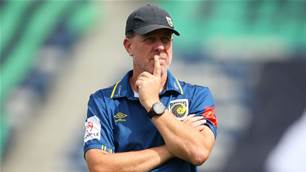This Czech superstar is credited with inventing interval training, but he was a sporting pioneer in many ways.
This Czech superstar is credited with inventing interval training, but he was a sporting pioneer in many ways.
These days, there’s great talk about the rivalry between African running prodigies like Kenenisa Bekele and Haile Gebrselassie for the mantle of greatest distance runner of all time. It seems the main criterion is their versatility over a variety of distances. Indeed, these men are phenomenal runners.
But the deeds of one Czech at the 1952 Summer Olympics in Helsinki remain unrivalled. There, Emil Zatopek won gold in the 5000 metres, the 10,000m and the Marathon. Most remarkably, Zatopek, the 10,000m champion at London in 1948, had never run a Marathon, and only decided at the last minute to compete in it! He broke the Olympic record in all three events.
Zatopek, by any era’s criteria, was a freak. People can argue about standards of competition 60 years ago, or primitive training methods, but the arguments are irrelevant. Those daunting distances he dominated were no shorter than they are now. And as for training, Zatopek never employed anyone else’s methods. He was a true pioneer.
But it wasn’t just Zatopek’s training techniques that were novel. It was everything about him. Very few sportspeople before or since shared Zatopek’s profoundly unassuming view of sport, human endeavour or his place in the world. His amazing perspective made him a great competitor and a great man.
In a race, he’d run up alongside a rival, and without even a hint of “psych”, engage him in conversation, ask him his thoughts, and urge him on to greater effort. He’d do it because he cared about running more than he cared about winning. (Or so it seemed. He might just have been the slyest fox of all ...) A true sign of his authenticity, though, was when he gave one of his Helsinki gold medals to Ron Clarke, who’d set many records, but had never won an Olympics gold.
Zatopek would train in any conditions, preferring heavy work boots to the specially-designed running shoes that were becoming vogue. It’s said he pioneered “interval” training. He wouldn’t have bothered explaining the science, though. His logic was simple: if you run your fastest 400 metres continuously ‒ legend has it he’d do this 80 times in one session ‒ then you have just run a long way at your fastest, with a few short breaks for respite. If you could replicate this in one smooth performance during a race, no one could beat you. Two quotes sum up his philosophy. “You run fast for speed and repeat it many times for endurance,” and the hilariously apt “why should I practise running slow? I already know how to run slow. I want to learn to run fast”.
Because he was given to bunching his shoulders and tensing his arms, he had an obsession with finding ways to relax when running. To “trigger” relaxation, he’d adopt the unusual method of running with the tip of his index or middle finger touching his thumb.
Whatever Zatopek did, he’d do for hours ‒ jogging on the spot reading a book, for example. When his athlete wife broke her leg, he’d run with her on his back. She was a javelin thrower, and together they invented their own version of “kick-to-kick”, hurling a javelin at each other, catching it and returning it as quickly as possible.
Zatopek had a self-confessed “country” style of running ‒ an “inefficient” shamble. He’d wobble, his head would roll, his face would contort. He audibly wheezed and panted. The nicknames “Emil the Terrible” and “the Czech Locomotive” were not conferred without irony.
All this gave the distinct impression that Zatopek was an easybeat; ripe for the picking; fallible. Opponents would’ve had trouble reconciling the mixed signals, and it no doubt helped him win at distances where the head has as much to do with winning as the legs. But it wasn’t deliberate ... was it?
For that first-ever Marathon win, guileless as ever, he decided to plant himself alongside the world-record holder, Britain’s Jim Peters, just to learn something about how this race was run. The first 15 kilometres were punishing for Peters with Zatopek at his shoulder, and he already knew he’d been duped into going out way too hard.
That’s what he was thinking when he heard Zatopek wheeze up beside him. “What do you think of this race?” No slouch with the mind games himself, Peters shot back immediately at the gasping Czech. “Too slow.” Zatopek humbly took on board this observation from a world champion and thought he’d better accelerate. He left the astonished Peters in his wake. Peters never finished. Zatopek claimed the Olympic Games record and that incredible third gold. By the next year he held eight simultaneous world benchmarks, an achievement still unrivalled.
A true original in every way.
‒ Robert Drane
Related Articles

Champion A-League coach set to join Premier League giants

Emerging Socceroos star set to sign for MLS club












